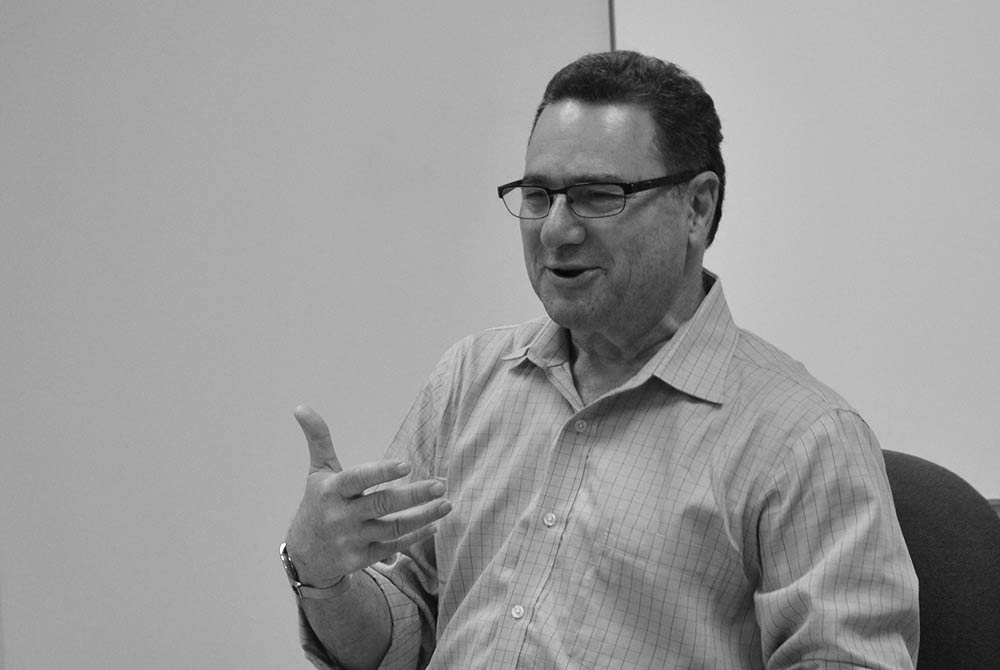Steven Krantz, MSW, Ph.D.
The Graduate School of Social Work

Dr. Steven Krantz has been a full-time clinical professor with the Touro College Graduate School of Social Work since its inception in 2006. He was a member of the founding team and likes to state that he remembers when the entire school was a cubicle. Though those days are long since gone, Dr. Krantz still maintains the same level of enthusiasm for each of his classes.
"There's something exhilarating about being a meaningful factor in a student's growth," Dr. Krantz stated. "It gives you a sense of enacting positive change in the world. It's a beautiful process."
Dr. Krantz is known for his creativity as a teacher and describes teaching as a balancing act.
"You have to know the direction you are taking in that particular class but also give yourself time to take detours and explore the terrain," said Dr. Krantz. "Move with the students yet return to the road."
During his classes, Dr. Krantz combines didactic knowledge, experiential exercises and examples from his own practice. One innovative teaching technique he is known for is "self-roleplay," where he models a dialog between a social worker and a client, allowing his students to learn practical skills for working with their own clients. Dr. Krantz also ensures that each student is actively engaged in his class, or as one student stated in a course evaluation, "It's impossible to fall asleep in Dr. Krantz's class."
Do you have a specific teaching philosophy?
I have a number of basic guiding principles:
It's crucial to have some clarity as to what the take-homes are for the students. Enter every class knowing the purpose is to have students walk out with certain specific additional learnings. Know the 2-3 central take-homes you want to deliver to the students. That's typically my organizing structure.
Create a balance between holding the reins of the classroom to guide it, but be flexible enough that you can spontaneously flow where the students are going. Know the road, but walk it loosely. It is a delicate balance. Students need to trust that you're attentive to the balance.
I teach primarily what we call practice classes in social work, the how-to classes. I actively integrate my own clinical practice into teaching the concepts of practice. I'm equipped to do this because I have an active clinical practice and I bring that to life for the students. This is extremely real and engaging for them.
Finally, being a social worker includes developing a professional identity, a way of being, a consciousness. You bring that to your clients and I try to bring that to my students, so they can see and experience me enacting some of these attributes directly with them. I guess you could call that offering myself up for identification.
Why do you teach?
I love teaching. I'm passionate about it. In part, it's a calling for me. There's something exhilarating about being a meaningful factor in a student's growth. It gives you a sense of enacting positive change in the world. It's a beautiful process. I also think there's an entertainer in me that really enjoys that aspect of teaching.
How did you become a social worker?
The first part of that answer is I didn't show up to the first day of law school [laughs]. Eventually, I ended up working for the New York State Unemployment Office trying to help people find jobs. The people I met there had so many problems: giving them the name of a company that could hire them was only a small part of what they needed. I found myself counseling them and I started feeling good about it. I was always passionate about social change and I was hooked on social work once I realized that it was a profession where you sat down and helped individuals solve their problems as well as contributing to broader social change.
How did you begin to teach?
I went into social work to be a practitioner and to work with people and help them have better lives. After getting my degree and working for a while, I returned for my doctorate at Adelphi to increase my clinical skills. And there was just something that called me to teaching, so I began to adjunct teach while I pursued my studies. To be a really good teacher you must have passion and, after all these years, I'm still passionate about my profession and teaching. Perhaps that's what helps me be the best teacher I can be. I'm both passionate about what I'm teaching and passionate about the teaching itself.
What are some of the memorable moments you've had teaching at GSSW?
In my substance abuse course I have students go to Alcoholics Anonymous and Narcotics Anonymous meetings and reflect and write about it. We talk about it in class and this experience often changes the lives of some of my students. It radically changes how they see people who have addictions; it changes the way they see friends and family members and sometimes themselves. Their lives change in a very personal way.

